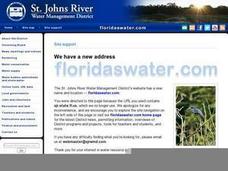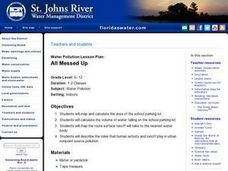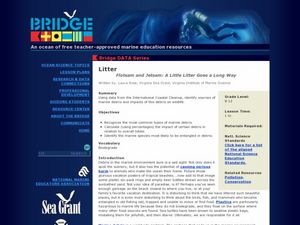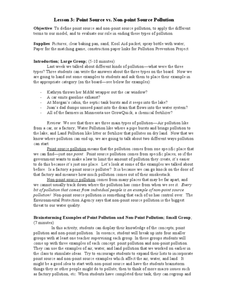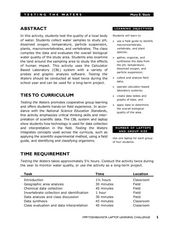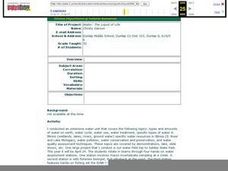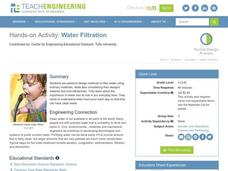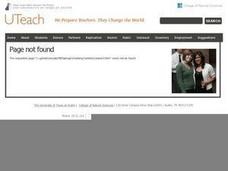Learning Games Lab
Cattle Feeding
Finding a balance between too much protein and not enough doesn't have to be a guessing game. Young scientists use an interactive lesson to learn how to calculate protein content in cattle feed and how to mix feed to create the ideal...
Curated OER
What's In Your Stream?
Learners conduct hands-on fieldwork in order to investigate water quality of a nearby stream. They discuss watersheds and how it affects water quality as well as identify any causes of changes or pollution in the area water before...
Curated OER
Where, Oh Where is All the Clean Air?
Students examine the history of air pollution dating back to the Roman Empire. In groups, they research the different types of pollutants in the air and how they can affect the environment. They participate in various experiments to...
Curated OER
What's in the Water?
Students make a water sampler and use proper techniques to collect water.They write a essay explaining the inter-relationship of factors such as temperature, pH, dissolved oxygen, nitrates, and phosphates in a lake that might cause a...
Curated OER
Lesson 11 - Potable Water
Students investigate the meaning of potable water and water reuse. They define water quality and quantity problems. They complete worksheets, a quiz and design a poster.
Curated OER
Colors of our Earth
Students are introduces to soil profile classification. They remember that classification of soils is an important aspect of studying soils as it aids in predicting how soils react to weathering, transport nutrients or pollution. ...
Curated OER
Clouds
Students explore clouds. In this weather lesson, students identify the steps in the water cycle, define condensation and evaporation, and relate this information to cloud formation. Students perform a cloud experiment, predict weather...
Curated OER
Particulate Matter
Seventh graders examine the different types of pollutants. For this environmental science lesson, 7th graders observe particulate matter under a microscope. They explain how these can affect once health when breathed in large quantities...
Curated OER
All Messed Up
Pupils begin the experiment by mapping and calculating their school parking lot. They calculate the volume of water falling on the lot and map the route the water runoff takes. They discuss the roles that humans play in affecting water...
Curated OER
Water Quality and Dissolved Oxygen
Students investigate the relationship between dissolved oxygen and organic materials and aquatic organisms. This is a 3-lesson series in which students explore dissolved oxygen and then design an experiment testing the effects of changes.
Curated OER
LitterFlotsam and Jetsam: A Little Litter Goes a Long Way
Students explore the concept of environmental stewardship. In this science lesson, students investigate data from the International Coastal Cleanup, identify sources of marine debris, and discover the impacts of this debris on wildlife.
Curated OER
Point Source vs. Non-point Source Pollution
Young scholars define and differentiate between point source and non-point source pollution. Students discuss various types of pollution including air, water and land pollution, analyze demonstrations and complete a worksheet.
Curated OER
Testing the Waters
Students explore water in depth through discussion, research, and experiment. Students apply map skills to locating particular regions of the world as they relate to water. Students predict water quality based on information researched...
Curated OER
Ocean Pollution
Young scholars study their role in eliminating ocean pollution and helping keep the oceans clean. In this environmental issues lesson, students define pollution and brainstorm examples of ocean pollution. Young scholars define...
Curated OER
Analyze the Results
Students conduct water tests and sample macroinvertebrates from a nearby source to make a general determination about the overall quality of water. They use worksheets and analyze data as part of a larger unit.
Curated OER
Water: The Liquid of Life
Sixth graders complete a activity on the properties, types and amounts of water on Earth. In groups, they travel between stations to identify water resources in Illinois and pollution sources. They complete the activity with a field...
Curated OER
Water Filtration
Students work together to examine the role of water in their lives. They discover the process to clean water so it is clean for one to drink. They explore the role of environmental engineers and their problem of getting clean water to...
Curated OER
Water Quality
Young scholars conduct experiments to study the quality of water. They examine how pollutants get into and affect the water supply in this unit.
Curated OER
Is Dilution the Solution to Pollution?
Students explore the different types of pollution. they conduct experiments using dye mixed with tap water to measure the levels of dilution. They discuss at what point the dye (pollution) would be diluted enough to be safe to drink.
Curated OER
Snow vs. Water
Students fill three cups with snow. They record the height of snow in each cup, and allow the snow to melt. Students measure the height of the water in each glass or cup, and record their results on the worksheet. They answer questions...
Curated OER
Water Walk
Students conduct a visual survey to discover information about local land use and water quality; document their findings by mapping and profiling the water body; and use this initial investigation to raise questions about local land use.
Colorado State University
What Is a "Model"?
Model the transfer of energy during a typical 24-hour period. Young scholars use a game-like approach to learning the patterns of heat transfer through the day and night. Groups of four exchange different tokens as the energy transfers...
Curated OER
Eye On Conservation Drainage Basin
Students are able to describe the importance of wetland vegetation. They describe the impacts human activities have on water systems. Students compare and contrast the effect of different soil types on water filtration.
Curated OER
What's Gotten Into You?
Students use models to investigate the process and consequences of water contamination on the land, groundwater, and plants.






